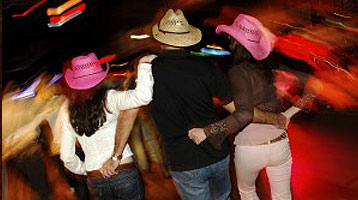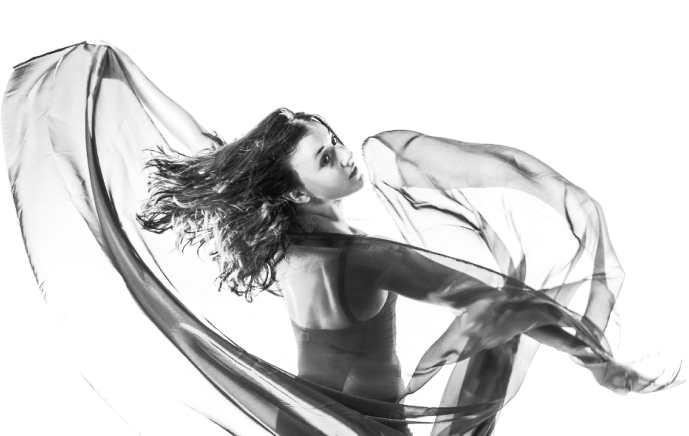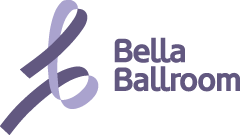
Social Dance
Country Line Dancing
A line dance is choreographed routine done with a group of people that has a repeated sequence of steps. Line dancing is great fun because it can be danced with or without a partner! Country Line Dancing is popular throughout the United States and is a favorite in country nightclubs, weddings and fitness centers.
History of Country Line Dancing
There are several different theories as to how and when line dancing originated. Line dancing has many forms and has existed for thousands of years in many parts of the world. The first known line dance instructions were written in a book of dance sheets in 1650 for English Country Dancing. Country line dancing appears to have originated in Europe and arrived to the United States with the settlers who immigrated to America.
Some theorists agree that the Country Line dancing that we know today evolved from the English Country Dances, or Contra dances, that were danced in the New England states of the U.S. in the early 1800s. These Contra dances came to America by the settlers who brought their dance traditions with them. Contra dancing was a combination of European folk dances and country dancing. In Contra dancing (which is still done today) men and women stand in two separate facing lines and dance with each other. This type of line dancing had dance step patterns that were fixed so that everyone could participate.
By the mid 1800s, Western and Country dancing became very popular from the Midwest to the West Coast. While the majority of these dances were couple dances that followed set steps, some were line dances.
Line dances continued to develop in the United States. In the 1950s and the 1960s, a few line dances developed like “The Madison,” “Hully Gully,” and “San Francisco Stomp.” By the 1970s, line dances were done to many popular music styles including pop, rock and roll, swing, disco, Latin, and Jazz. The 1970s brought line dances like the “Cowboy Boogie” and the “L.A. Hustle” which combined country music with Disco songs. A few dozen more line dances for country songs were developed in the 1980s and the Country line dancing that is recognized today was probably born in Nashville, Tennessee during this time. Jim Ferrazano allegedly wrote the line dance steps to the song “Tush Push” on a napkin sometime in the 80s. Dancer Melanie Greenwood, who became a famous line dance choreographer, then tested Jim Ferrazano’s dance and brought it to the dance floor. Melanie Greenwood later wrote the line dance instructions to the song “Achy Breaky Heart” by Billy Ray Cyrus. “Achy Breaky Heart” became a huge hit in 1992 and country line dancing was catapulted into the mainstream.
Line Dancing Today
Today, line dancing has very traditional dances to country music as well as popular line dances to non country music. Line dancing is popular in country-western dancing nightclubs, weddings, social clubs, ballrooms and parties worldwide. It is also used for health and fitness in gyms and fitness clubs. You can also find country line dancing in community centers as people dance as a part of social welfare and recreational programs.
Some of the most popular country line dances today are: “Tush Push,” “Cotton Eyed Joe,” “Boot Scootin’ Boogie,” “Hoedown Throwdown,” “Cowboy Cha Cha,” “Slap Leather,” “Swamp Thing,” and “Watermelon Crawl.” Some common non-country line dances are: “Electric Slide,” “Cha Cha Slide,” “Macarena,” “Cupid Shuffle,” and “Chicken Dance.” The “Macarena” and the “Chicken Dance” are examples of modern line dances that are danced in a circle instead of a line formation.
In more recent years, music has been written to cater to dancers whereas originally dances were written to cater to the music. This has opened the doors for some dances to be done to the music of choice of the dancer.
Country line dancing has spread to other parts of the world but predominately remains in the United States, Australia, and Europe. Country line dancing’s arrival to Europe was aided by the arrival of Country Music Television in 1998. In 2014, Durham, N.C. was declared the line dancing capital of America after a capital ranking of MeetUp groups.
Online databases have been created for dancers to look up existing line dances by the name of the dance, the name of the choreographer, and the music. These databases also provide searches for places to line dance.
Line dancing is popular because it is easy to learn and avoids the problem of an imbalance of male to female partners that troubles ballroom and social partner dancers. Country line dancing is often partnered with other country western dances such as the country two-step, western promenade dances, and western-style variations of the waltz, swing, and polka.
Country Line Dance Songs
- “Electric Slide Boogie” Marcia Griffiths
- “Watermelon Crawl” Tracy Byrd
- “Cha Cha Slide” Slide Man
- “Cotton Eye Joe” Rednex
- “Baby Likes to Rock It” The Tractors
- “Achy Breaky Heart” Billy Ray Cyrus
- “Honky Tonk Badonkadonk” Trace Adkins
- “Boot Scootin’ Boogie” Brooks and Dunn
- “Good Time” Alan Jackson
- “Footloose” Blake Shelton
- “Baby Like to Rock It” The Tractors
- “Country Girl (Shake it for Me)” Luke Bryan
- “Save a Horse (Ride a Cowboy)” Big and Rick
- “Get Into Reggae Cowboy” The Bellamy Brothers
- “Dizzy” Scooter Lee
- “Watermelon Crawl” Tracy Byrd
- “Boot Scootin’ Boogie” Brooks and Dunn
- “Good Time” Alan Jackson
- “Cupid Shuffle” Cupid
- “Born to Boogie” Hank Williams
- “Centerfield” John Foggerty
- “Cest La Vie” Bob Segar
- “Whole Lot of Shakin’ Going On” The Tractors
- “That’s the Way I Like it” KC & The Sunshine Band
- “Tuff Enuff” The Fabulous Thunderbirds
- “Sharp Dressed Man” ZZ Top
- “Swing the Mood (Dance Mix)” Jive Bunny
- “Neon Moon” Brooks and Dunn
- “Redneck Girl” The Bellamy Brothers
- “Tangled Up in Texas” Billy Burnette
- “La Grange” ZZ Top
- “Two Piña Coladas” Garth Brooks
- “Darlene” T. Graham Brown
- “Hog Wild” Hank Williams
- “Chattahooche” Alan Jackson
- “I Feel Lucky” Mary Chapin Carpenter
- “I Love a Rainy Night” Eddie Rabbit
- “Don’t Rock the Jukebox” Alan Jackson
- “Swamp Thing” The Grid


